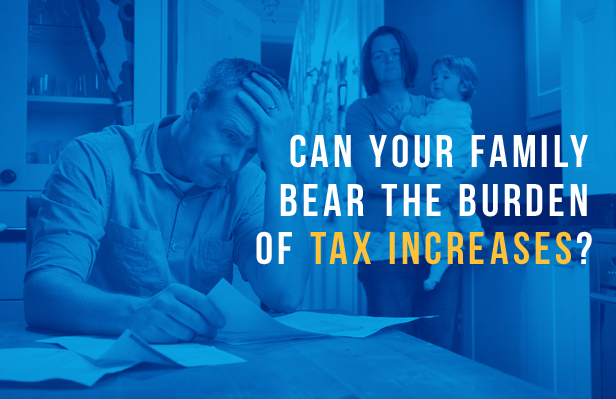Commentary

Can Your Family Bear the Burden of Tax Increases?
Note: This commentary first appeared in the York Daily Record.
Can you afford to lose the equivalent of a mortgage payment? How about four?
Given a possible 188 percent increase in the state income tax rate to pay for Tom Wolf’s education spending plans, these questions could be in York residents’—and all Pennsylvanians’—futures.
According to a new Commonwealth Foundation analysis, just two of Wolf’s education proposals would cost taxpayers more than $4.6 billion annually. This huge rise in education spending would come at a time when state funding for public schools is at an all-time high, a fact many—especially government union leaders lobbying for more money from taxpayers—desperately seek to ignore.
What’s more, total state spending is also at its highest level ever.
As a result of decades of spending growth, Pennsylvania has the 10th highest state and local tax burden in the country. This burden could grow even heavier, especially for higher income earners, under Wolf’s “progressive” tax proposal.
Wolf’s tax proposal is almost certainly unconstitutional under Article VIII, Section 1 of Pennsylvania’s Constitution, which requires taxes to be uniform throughout the state. By moving to a progressive tax system, with different exemptions for tax filers, the Uniformity Clause of Pennsylvania’s Constitution would surely be violated.
Despite the question of constitutionality and Wolf’s vagueness on the precise details of his tax plans, the Commonwealth Foundation was able to estimate the impact needed to pay for just two of Wolf’s major education proposals.
We analyzed his proposal to make the tax system more “progressive,” assuming a $30,000 universal tax exemption. This means any income above $30,000 would be taxed at a higher rate, while income less than this threshold would not have any state income tax liability.
Remember, the rate needs to be high enough to pay for $4.6 billion in new education spending. To produce this revenue, Pennsylvania’s income tax rate would have to more than double from 3.07 percent to 6.8 percent.
Under this new tax structure, households earning more than $54,700 would see an increase in their tax bill. For example, an individual making $70,000 a year—which is around the average salary for a York public school teacher—would see an increase of $571 in state income taxes annually.
When confronted about the ambiguity surrounding his plan recently, Wolf said those making $70,000 to $90,000 (or those filing jointly making $140,000 to $180,000) would not see their income tax bill rise. With this in mind, we recalculated what the tax rate and universal exemption would need to be to pay for the more than $4.6 billion in new spending.
We decided to use the midpoint of Wolf’s range ($80,000) as our “break-even” point—the point above which taxpayers would begin to see their tax bills increase. By our estimation, most of those earning more than $80,000 would pay higher taxes, while those earning less get a tax break.
The verdict? A tax rate of 8.85 percent on income above $52,200 would now be necessary. That’s a 188 percent increase (almost a tripling) of the income tax rate!
Here’s what that means for you. With an average salary of $70,000 each, a household of two York teachers would report an income of $140,000. Their tax bill would increase by a staggering $3,472 per year.
According to realtor.com, that’s more than the cost of four mortgage payments on the average home in York (price $212,102).
A household reporting income of $100,000 would pay an additional $1,160 annually.
While promising more funding for education programs is always popular, it’s important to know that the funding has to come from somewhere.
After hearing that Pennsylvania already spends almost $3,000 more per student than the national average, a majority of Pennsylvanians said they would not be willing to personally pay higher taxes to increase education funding.
Under Wolf’s tax regime, Pennsylvania’s economic competiveness is sure to suffer. At 8.85 percent, Pennsylvania’s income tax rate would jump to the eighth highest in the nation overnight.
At a time when Americans already pay more in taxes than they do for food, clothing, and housing combined, the consequences of steep tax increases for Pennsylvania families cannot be ignored.
# # #
Bob Dick is a policy analyst at the Commonwealth Foundation (CommonwealthFoundation.org), Pennsylvania’s free market think tank.